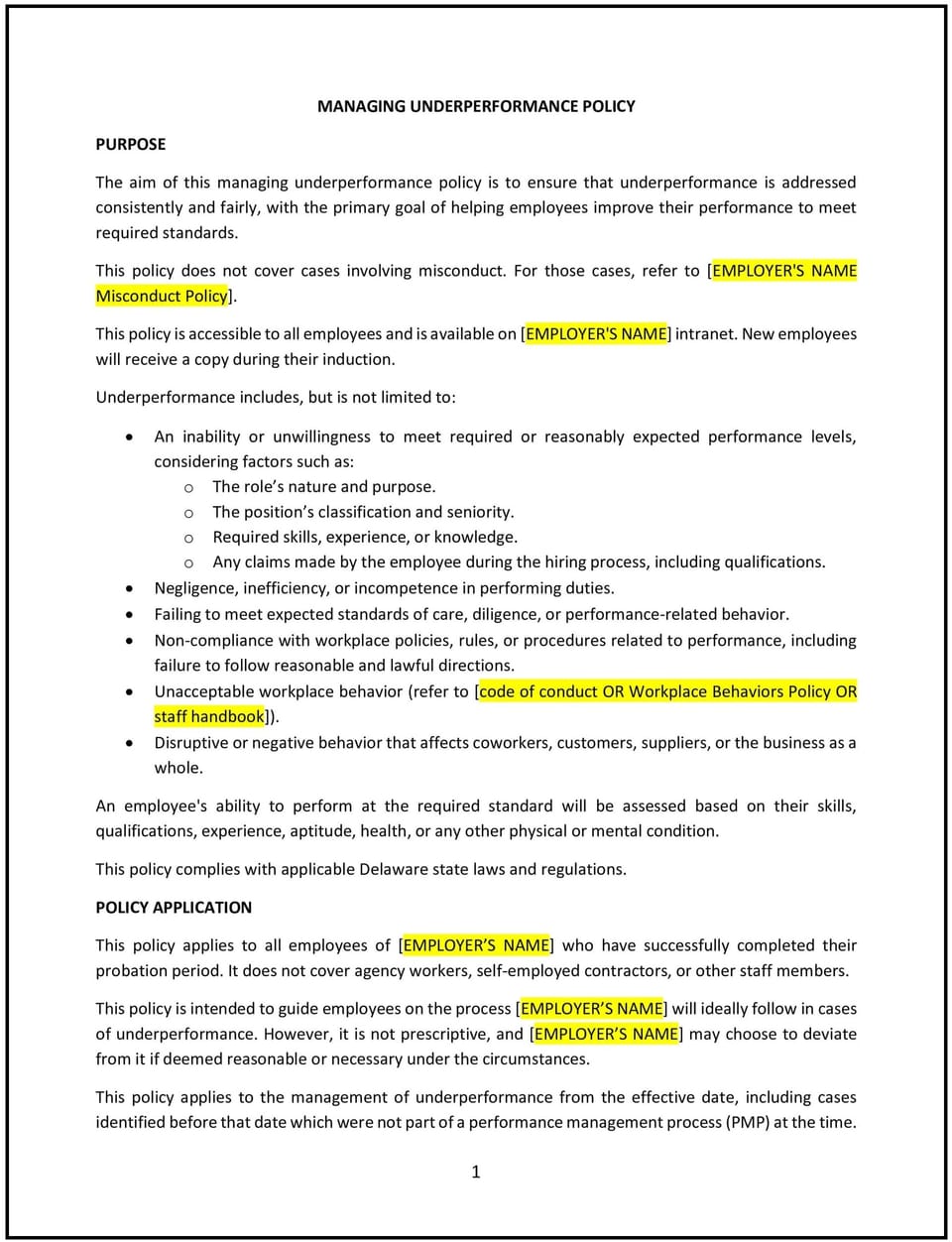Managing underperformance policy (Delaware): Free template

Managing underperformance policy (Delaware)
A managing underperformance policy helps Delaware businesses address and resolve employee performance issues effectively and fairly. This policy outlines the steps for identifying, communicating, and improving underperformance while ensuring compliance with Delaware labor laws and fostering a supportive work environment.
By implementing this policy, businesses can maintain productivity, support employee development, and reduce workplace conflicts.
How to use this managing underperformance policy (Delaware)
- Define underperformance: Clearly outline what constitutes underperformance, such as failing to meet job expectations, deadlines, or quality standards.
- Establish a performance review process: Detail how performance issues will be identified and evaluated, including regular reviews or feedback sessions.
- Communicate concerns: Encourage managers to discuss performance issues with employees promptly and constructively, outlining specific examples and expectations for improvement.
- Develop improvement plans: Provide a framework for creating performance improvement plans (PIPs) that include measurable goals, timelines, and support resources.
- Monitor progress: Schedule follow-up meetings to review the employee’s progress and provide additional guidance if needed.
- Address ongoing issues: If performance does not improve, outline next steps, such as reassignment, further training, or termination, while ensuring compliance with Delaware laws.
Benefits of using this managing underperformance policy (Delaware)
This policy offers several benefits for Delaware businesses:
- Enhances productivity: Provides a structured approach to addressing and improving employee performance.
- Ensures fairness: Promotes consistency in handling underperformance, reducing the risk of perceived bias or favoritism.
- Supports employee development: Helps employees understand expectations and provides resources for improving their skills and performance.
- Reduces turnover: Encourages performance improvement, minimizing the need for termination and rehiring.
- Ensures compliance: Aligns with Delaware labor laws, reducing the risk of legal disputes related to performance management.
Tips for using this managing underperformance policy (Delaware)
- Communicate the policy clearly: Ensure employees and managers understand the steps involved in addressing underperformance.
- Provide training: Equip managers with the skills to have constructive performance discussions and develop effective improvement plans.
- Document everything: Keep detailed records of performance reviews, improvement plans, and follow-up meetings to ensure transparency and compliance.
- Offer support: Provide employees with access to training, coaching, or other resources to help them meet performance expectations.
- Review regularly: Update the policy to reflect changes in Delaware labor laws, industry standards, or workplace practices.
Q: Why is a managing underperformance policy important for my business?
A: This policy ensures a fair and structured approach to addressing performance issues, supports employee development, and helps maintain productivity while reducing legal risks.
Q: How should managers address underperformance?
A: Managers should address underperformance by identifying specific issues, discussing them constructively with employees, and creating a performance improvement plan with clear goals and timelines.
Q: What is a performance improvement plan (PIP)?
A: A PIP is a formal document outlining specific performance goals, required actions, timelines, and available resources to help employees address and improve underperformance.
Q: What happens if an employee’s performance does not improve?
A: If performance does not improve despite reasonable efforts and support, the policy may outline steps such as reassignment, further training, or termination in compliance with Delaware laws.
Q: How often should this policy be reviewed?
A: This policy should be reviewed annually or whenever Delaware labor laws or company practices regarding performance management change to ensure continued relevance and compliance.
This article contains general legal information and does not contain legal advice. Cobrief is not a law firm or a substitute for an attorney or law firm. The law is complex and changes often. For legal advice, please ask a lawyer.


